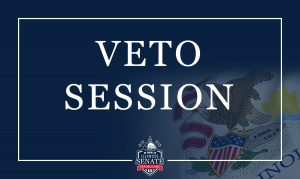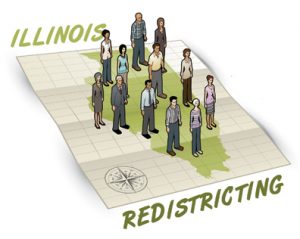 SPRINGFIELD – Illinois lawmakers returned to the Capitol Oct. 26 for the final three days of the annual fall Veto Session.
SPRINGFIELD – Illinois lawmakers returned to the Capitol Oct. 26 for the final three days of the annual fall Veto Session.
During the week, Democrat leaders passed legislation eroding the rights of parents, which could potentially leave them in the dark about their minor children’s abortion procedures.
Later in the week, an amendment to the long-standing Health Care Right of Conscience Act passed out of the General Assembly, despite tens of thousands of Illinoisans filing witness slips in opposition.
Meanwhile, new Congressional maps were passed in the early-morning hours of Oct. 29 even though no public hearing was held to review it.
Parental rights eroded
 While the General Assembly was back in Springfield for its annual fall Veto Session, Democrat leaders pushed through the repeal of the Parental Notice of Abortion (PNA) Act of 1995.
While the General Assembly was back in Springfield for its annual fall Veto Session, Democrat leaders pushed through the repeal of the Parental Notice of Abortion (PNA) Act of 1995.
Under the legislation, which is now on the Governor’s desk, facilities performing an abortion procedure on a minor child will no longer have to notify the minor’s parents or legal guardians 48 hours before the procedure. Previously, the law simply stipulated that parents be informed of their minor children’s procedures, but there was no requirement for them to provide consent.
State Sen. Jil Tracy (R-Quincy) says the repeal of the PNA is a terrible blow to parental rights in the state and could potentially deny parents the chance to provide their minor children with the care and support they need during an important and difficult time in their life.
Opponents of the PNA argued that the law was an unnecessary burden for minor children who are victims of abuse. However, Senate Republicans argue that the law actually provides safeguards to vulnerable minor children who may be pressured into an abortion by their abusers.
According to the Guttmacher Institute, Illinois will join eight other states that have no laws requiring any parental involvement in minor children’s abortion decisions. Gov. JB Pritzker is expected to sign the legislation.
Democrat leaders force changes to HCRCA
During the late hours of Oct. 28, Senate Democrat leaders rammed through changes to the Health Care Right of Conscience Act (HCRCA) with a 31-24 vote, sending it to the Governor’s desk. The HCRCA has been a long-standing law that allows people to be protected from being forced into healthcare decisions that violate their religious or moral beliefs.
Until recently, the Governor’s nearly 100 Executive Orders have gone mostly unchecked by the Democrat-controlled General Assembly or Illinois courts. However, based on protections provided to plaintiffs under the HCRCA, some courts appeared to be poised to rule against the Governor, which prompted the push by Democrat leaders to amend it.
The new changes to the HCRCA state that its protections do not apply when it comes to COVID-related mandates. Since the amendment was unable to garner a three-fifths majority vote in the House and Senate, the changes do not take effect until June 1, 2022. That being said, it may be used in upcoming court cases and there are indications that the General Assembly may pass an identical bill during the upcoming January session, which would give it an immediate effective date.
Despite lack of public input, vote taken on Congressional maps
 On Oct. 28, Senate Democrat leaders called their newly revised Congressional maps for a vote around 9:00 p.m., despite the fact the map was made public only two hours earlier and no public hearing was conducted to review its changes. The map would later pass out of the House with the minimum 71 votes required.
On Oct. 28, Senate Democrat leaders called their newly revised Congressional maps for a vote around 9:00 p.m., despite the fact the map was made public only two hours earlier and no public hearing was conducted to review its changes. The map would later pass out of the House with the minimum 71 votes required.
The final map passed was the fourth version that Illinois Democrats proposed since Oct. 15.
In spite of the fact that Gov. Pritzker vowed to veto any map drawn by politicians, several news outlets reported that the Governor and his staff engaged in the drawing of the Congressional map. If accurate, this would mean that the Governor has not only broken his promises by signing two different legislative maps drawn by politicians, one of which has been ruled unconstitutional, but also became an active participant in a process he campaigned against in 2018.
